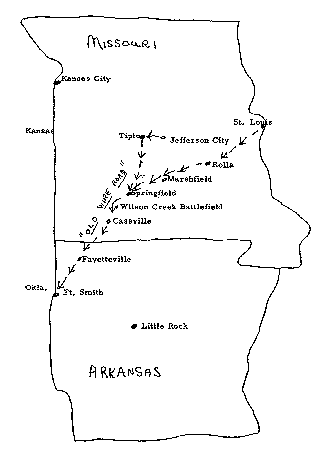The Old Wire Road
by Connie Sherer
Reprinted from "INSULATORS - Crown Jewels of the Wire", September 1970, page 11
In pursuing my correspondence with collecting insulators, had an interesting letter from a lady (a non-collector) who lives near Marshfield, Missouri. Knowing of our interest in insulators, she wrote:
“We live on a dairy farm in Southwest Missouri and a telegraph line ran through our farm until it was torn down last year and replaced with underground cables. The line
was called 'The Old Wire Road' and extended from St. Louis to the Indian Territory in Oklahoma and was in use during the Civil War. Messages were sent from St. Louis to Springfield (25 miles west of here) and several battles were fought around here including the Battle of Sand Springs which is located on our farm. The wire lead through part of our farm through the area of Sand Spring. The Old Wire Road is mentioned in several history books and in the history of 'The Battle of Wilson Creek' (near Springfield) which is now a national monument.”
I hoped to learn more about the Old Wire Road so I wrote a letter with the
above information to the Wilson Creek National Monument. My letter was referred to George W. Carver National Monument, Diamond, Mo. for reply by David L. Hieb, Superintendent.
The following information does not verify the above account, but then it does not completely disqualify it either. I am offering it solely as a point of historical interest to other collectors. Perhaps it will be of help to someone else in this area to discover more about the Old Wire Road, or to even find some of the original insulators!
Superintendent Hieb wrote:
"Your letter of February 20 addressed to Wilson's Creek National Park has been
referred to us. We were aware of the hobby of collecting early insulators, and can
appreciate your interest in the early telegraph line which paralleled one of the early roads from Springfield, Missouri to Fort Smith, Arkansas, and led to its being referred to as 'The Old Wire Road' or 'The Telegraph Road'.
"This early road from Springfield to the southwest probably followed an old Indian trail, but it was declared a public highway and officially located and cleared by order of the Greene County Court in 1836. Later on it is perhaps best known in history because of its use by the Butterfield Stage and Overland Mail from 1858 to 1861. The Butterfield Stage route began at the railhead at Tipton, Missouri west of Jefferson City, Missouri, and ran south to Springfield. It appears to have been along this line from Jefferson City to Springfield that the first telegraph line was opened in the spring of 1860. During the summer of 1860 the telegraph line was extended along the stage route through Cassville,
Missouri: Fayetteville, Arkansas, and on to Fort Smith. The meager source material
available to us here indicates this line was discontinued at the close of the Civil War. All evidences of it in the vicinity of Wilson's Creek Battlefield have long since
disappeared, and so far as we know, none of the original wire or insulators are preserved in local
collections.
"During the Civil War period there was also a road connecting Springfield with the railhead at Rolla which would have passed near Marshfield; however, I have no information regarding the existence of a telegraph line on that route.
"You might find additional information concerning early telegraph lines in this part of Missouri in the
Past and Present of Greene County, Missouri by Jonathon Fairbanks and C. E. Tuck, published in Indianapolis in 1915; or in the
History of Greene County by E. F. Perkins and T. M. Horne, published in St. Louis, 1883."

I do not have access to these two books, or would research this area more fully myself.
It would seem fairly safe to conclude that the Old Wire Road did indeed run from
Springfield, Missouri to Ft. Smith, Arkansas, but if and where it went from Springfield through Marshfield, and Rolla to St. Louis is just conjecture. In my opinion there would be a good chance it did, since undoubtedly, St. Louis would have been an important city during the Civil War.
I could learn nothing else about the line from the lady in Marshfield. I would assume that the line she referred to was not the original, but perhaps could have followed the original old line.
|
